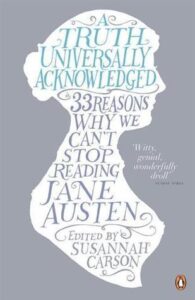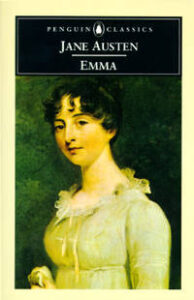 While twelve readings of Pride and Prejudice give you twelve periods of pleasure repeated, as many readings of Emma give you that pleasure, not repeated only, but squared and squared again with each perusal, till at every fresh reading you feel anew that you never understood anything like the widening sum of its delights.
While twelve readings of Pride and Prejudice give you twelve periods of pleasure repeated, as many readings of Emma give you that pleasure, not repeated only, but squared and squared again with each perusal, till at every fresh reading you feel anew that you never understood anything like the widening sum of its delights.
Reginald Farrer
I found the sentence above in an essay by Lionel Trilling, included in A Truth Universally Acknowledged edited by Susannah Carson, which I’d had on my shelf for years, and forgotten about until my recent Jane Austen binge. And I thought, yes! Though in my latest Japanese reading of P&P, I found more detail, more complexity, it was essentially the same book, only more so. But Emma seemed like a different novel altogether.
So I’ve also been reading books like Susannah Carson’s, and typing things like ‘Jane Austen’s Moral Vision’ into a search engine. Discovering what critics and academics and writers have to say – even watching filmed lectures! – is so very interesting and enlightening.
I’m no critic, however, so I’ll just note the things that struck me this time around.
1. Emma is stuck with Mr Woodhouse.
Poor Emma! Gentle and sweet-natured he may be, but Mr Woodhouse is also selfish, demanding and irrational. It’s the tyranny of the weak. I had thought he was a comic figure, but no. He’s a man whose concerns have narrowed to fire-screens and gruel, and Emma, as his carer, has to baby him, placate him, coddle and coax and calm him. Though to all intents and purposes she is the self-satisfied mistress of Hartfield, she is trapped. No wonder she is so sad when her governess, Miss Taylor, marries. No wonder she pounces in Harriet Smith! Just to have a third person there with her, and not be always left alone with him.
2. Highbury is an ecosystem.
And how complex it is. Everybody, all together, no matter what their place is in the class system, makes it tick. The characters are constantly passing along news, gossip, favours, kindnesses, patronage, advice, opinions. The action ebbs and flows around the streets of the village to the vicarage, the school, Ford’s haberdashery, the Crown Inn, Donwell Abbey, Randalls, Hartfield and the Cole’s nouveau riche establishment.
3. Society is in transition
Emma’s snobbishness is challenged and overcome in some instances, and justified in others. Sometimes she works it out for herself; the social climbing of kind, neighbourly Mr Coles is acceptable, but that of pretentious Mrs Elton is not. But Mr Knightley has to help her to understand that the prosperous, sensible Martin family are worthy of her attention, too.
4. There are lessons on how to be good that are relevant today.
Be kind. Be accepting. Don’t interfere, or make mischief, or lie and deceive. People are not playthings.
And as far as you possibly can, know yourself.
 “O God! that I had never seen her!”
“O God! that I had never seen her!”
The rest of the day, the following night, were hardly enough for her thoughts. She was bewildered by all that had rushed on her within the last few hours. Every moment had brought a fresh surprise; and every surprise must be a matter of humiliation to her. How to understand it all! How to understand the deceptions she had been thus practising on herself, and living under! The blunders, the blindness of her own head, and heart! She sat still, she walked about, she tried her own room, she tried the shrubbery – in every place, every posture, she perceived that she had acted most weakly; that she had been imposed on by others to a most mortifying degree; that she had been imposing upon herself in a degree yet more mortifying; that she was wretched, and should probably find this day but the beginning of wretchedness.
To understand, thoroughly understand her own heart, was the first endeavour.

I found Helena Kelly’s Jane Austen The Secret Radical illuminating, if you ever come across it.
Thank you, I will look out for it.